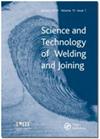Investigation of keyhole behaviour and its impact on the performance of laser beam oscillating welding through imaging and acoustic signal analysis
IF 3.7
3区 材料科学
Q2 MATERIALS SCIENCE, MULTIDISCIPLINARY
Science and Technology of Welding and Joining
Pub Date : 2023-10-08
DOI:10.1080/13621718.2023.2262790
引用次数: 0
Abstract
AbstractAs an emerging laser welding optimisation technique, beam oscillation still lacks detailed investigation into its underlying process mechanisms. This study investigates the microstructure and mechanical properties of 316LN welded joints under four oscillation modes, the results demonstrate that beam oscillation can suppress columnar grain growth and reduce porosity defects, thereby enhancing weld formation and mechanical properties. Building upon these findings, visual and acoustic sensing techniques are employed to analyse dynamic features of keyholes and energy distribution. The correlation between keyhole geometric features and porosity propensity across different oscillation modes is elucidated through visual information. Additionally, the time and frequency domain features of the acoustic signals effectively characterise the stability of the welding process and laser energy absorption efficiency.KEYWORDS: Laser beam oscillation welding316LN stainless steelprocess monitoringmechanical propertiesmicrophoneacoustic emissionlaser keyhole Disclosure statementNo potential conflict of interest was reported by the author(s).Additional informationFundingThis research is financially supported by the National Natural Science Foundation of China [grant No. 52175309], and the National Key Research and Development Program of China [grant No. 2018YFB1107900].通过成像和声信号分析研究激光振荡焊接的锁孔行为及其对焊接性能的影响
摘要光束振荡作为一种新兴的激光焊接优化技术,其潜在的工艺机制尚缺乏深入的研究。研究了4种振荡模式下316LN焊接接头的显微组织和力学性能,结果表明,梁的振荡可以抑制柱状晶粒的生长,减少气孔缺陷,从而改善焊缝的形成和力学性能。在此基础上,利用视觉和声学传感技术分析了锁孔的动态特征和能量分布。通过视觉信息阐明了不同振荡模式下锁孔几何特征与孔隙度倾向性之间的关系。此外,声信号的时域和频域特征有效地表征了焊接过程的稳定性和激光能量吸收效率。关键词:激光束振荡焊接316ln不锈钢工艺监测力学性能麦克风声发射激光锁孔披露声明作者未报告潜在利益冲突。本研究得到国家自然科学基金项目[批准号:52175309]和国家重点研发计划项目[批准号:2018YFB1107900]的资助。
本文章由计算机程序翻译,如有差异,请以英文原文为准。
求助全文
约1分钟内获得全文
求助全文
来源期刊

Science and Technology of Welding and Joining
工程技术-材料科学:综合
CiteScore
6.10
自引率
12.10%
发文量
79
审稿时长
1.7 months
期刊介绍:
Science and Technology of Welding and Joining is an international peer-reviewed journal covering both the basic science and applied technology of welding and joining.
Its comprehensive scope encompasses all welding and joining techniques (brazing, soldering, mechanical joining, etc.) and aspects such as characterisation of heat sources, mathematical modelling of transport phenomena, weld pool solidification, phase transformations in weldments, microstructure-property relationships, welding processes, weld sensing, control and automation, neural network applications, and joining of advanced materials, including plastics and composites.
 求助内容:
求助内容: 应助结果提醒方式:
应助结果提醒方式:


